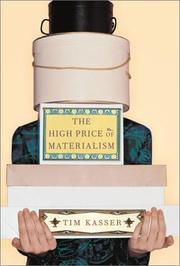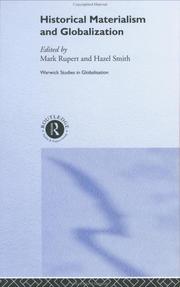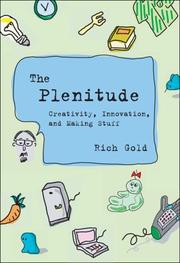| Listing 1 - 4 of 4 |
Sort by
|
Book
Year: 2017 Publisher: UCL Press
Abstract | Keywords | Export | Availability | Bookmark
 Loading...
Loading...Choose an application
- Reference Manager
- EndNote
- RefWorks (Direct export to RefWorks)
Here is an idea that just might save the world. It is that science, properly understood, provides us with the methodological key to the salvation of humanity. A version of this idea can be found in the works of Karl Popper. Famously, Popper argued that science cannot verify theories but can only refute them, and this is how science makes progress. Scientists are forced to think up something better, and it is this, according to Popper, that drives science forward. But Nicholas Maxwell finds a flaw in this line of argument. Physicists only ever accept theories that are unified – theories that depict the same laws applying to the range of phenomena to which the theory applies – even though many other empirically more successful disunified theories are always available. This means that science makes a questionable assumption about the universe, namely that all disunified theories are false. Without some such presupposition as this, the whole empirical method of science breaks down. By proposing a new conception of scientific methodology, which can be applied to all worthwhile human endeavours with problematic aims, Maxwell argues for a revolution in academic inquiry to help humanity make progress towards a better, more civilized and enlightened world.
Science --- Philosophy. --- Popper, Karl R. --- civilization --- reason --- karl popper --- the enlightenment --- science --- intellectual revolution --- education --- Albert Einstein --- Alberta Order of Excellence --- Empiricism --- Falsifiability --- Metaphysics --- Physicalism --- Quantum mechanics --- Scientific method --- Theoretical physics

ISBN: 9780262611978 026211268X 9780262112680 026261197X 9786612099939 0262276763 1282099930 0585448469 9780262276764 9780585448466 9781282099937 Year: 2002 Publisher: Cambridge, MA : MIT Press,
Abstract | Keywords | Export | Availability | Bookmark
 Loading...
Loading...Choose an application
- Reference Manager
- EndNote
- RefWorks (Direct export to RefWorks)
A study of how materialism and consumerism undermine our quality of life.
Acquisitiveness --- Avarice --- Conduct of life --- Happiness --- Materialism --- -#PBIB:2002.4 --- Physicalism --- Animism --- Philosophy --- Positivism --- Dualism --- Idealism --- Mechanism (Philosophy) --- Monism --- Realism --- Gladness --- Emotions --- Cheerfulness --- Contentment --- Pleasure --- Well-being --- Ethics, Practical --- Morals --- Personal conduct --- Ethics --- Philosophical counseling --- Covetousness --- Greed --- Deadly sins --- Wealth --- Acquisitive desire --- Grasping (Psychology) --- Personality --- Compulsive shopping --- Psychological aspects --- Moral and ethical aspects --- Materialisme --- Welzijn --- Materialisme. --- Welzijn. --- #PBIB:2002.4 --- Acquisitiveness. --- Avarice. --- Happiness. --- Conduct of life. --- Psychological aspects. --- COGNITIVE SCIENCES/Psychology/Cognitive Psychology --- ECONOMICS/General

ISBN: 1315541408 1134900368 1134900295 0415263700 0415263719 9781134900299 9781134900367 9780415263702 9780415263719 9781315541402 9781134900435 Year: 2016 Publisher: Abingdon, Oxon New York
Abstract | Keywords | Export | Availability | Bookmark
 Loading...
Loading...Choose an application
- Reference Manager
- EndNote
- RefWorks (Direct export to RefWorks)
Globalization. --- International economic relations --- Globalization --- Materialism --- International Commerce --- Commerce --- Business & Economics --- Economic aspects --- International economic relations. --- Materialism. --- Economic aspects. --- Physicalism --- Economic policy, Foreign --- Economic relations, Foreign --- Economics, International --- Foreign economic policy --- Foreign economic relations --- Interdependence of nations --- International economic policy --- International economics --- New international economic order --- Matérialisme historique --- Animism --- Philosophy --- Positivism --- Dualism --- Idealism --- Mechanism (Philosophy) --- Monism --- Realism --- Economic policy --- International relations --- Economic sanctions --- E-books --- Historical materialism --- Relations économiques internationales --- Matérialisme historique --- Mondialisation --- materialisme --- globalisering

ISBN: 0262072890 9780262072892 9786612099281 0262273993 1282099280 1435616952 0262294052 9780262273992 9781435616950 9780262294058 9781282099289 6612099283 9780262543798 0262543796 Year: 2007 Publisher: Cambridge (Mass.) MIT press
Abstract | Keywords | Export | Availability | Bookmark
 Loading...
Loading...Choose an application
- Reference Manager
- EndNote
- RefWorks (Direct export to RefWorks)
Lessons from and for the creative professions of art, science, design, and engineering: how to live in and with the Plenitude, that dense, knotted ecology of human-made stuff that creates the need for more of itself.
Consumption (Economics). --- Creative ability. --- Creative thinking. --- Material culture. --- Materialism. --- Technological innovations. --- Creative ability --- Creative thinking --- Technological innovations --- Material culture --- Materialism --- Consumption (Economics) --- Social Sciences --- Psychology --- design --- creativiteit --- ontwerp --- technologie --- productontwikkeling --- productdesign --- consumptie --- consumptiemaatschappij --- materialisme --- designtheorie --- 745.01 --- Consumer demand --- Consumer spending --- Consumerism --- Spending, Consumer --- Physicalism --- Breakthroughs, Technological --- Innovations, Industrial --- Innovations, Technological --- Technical innovations --- Technological breakthroughs --- Technological change --- Creative thinking (Education) --- Creativeness --- Creativity --- Demand (Economic theory) --- Animism --- Philosophy --- Positivism --- Dualism --- Idealism --- Mechanism (Philosophy) --- Monism --- Realism --- Culture --- Folklore --- Technology --- Creative ability in technology --- Inventions --- Domestication of technology --- Innovation relay centers --- Research, Industrial --- Technology transfer --- Thought and thinking --- Ability --- Creation (Literary, artistic, etc.)
| Listing 1 - 4 of 4 |
Sort by
|

 Search
Search Feedback
Feedback About UniCat
About UniCat  Help
Help News
News